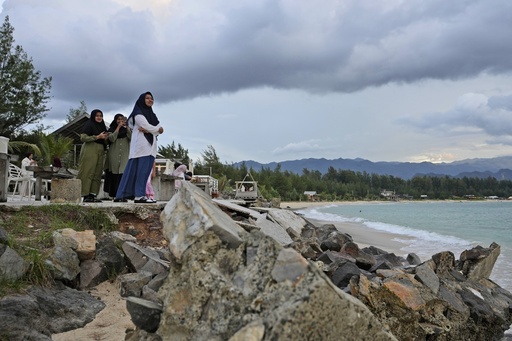
“`html
LHOKNGA, Indonesia — At 28 years old, Qurrata Ayuni stands as a symbol of resilience in her community. A survivor of the catastrophic earthquake and tsunami that struck her hometown nearly twenty years ago, she is determined to foster a supportive environment for women in Aceh, which is traditionally known for its male-centric coffee culture. She has established a café that not only serves delicious coffee but also serves as a safe and inclusive haven, particularly focusing on empowering female workers in an area that was heavily impacted by the tragedy.
On December 26, 2004, a powerful earthquake with a magnitude of 9.1 occurred off the coast of Sumatra, Indonesia, leading to a devastating tsunami that resulted in approximately 230,000 fatalities across multiple countries, even reaching parts of East Africa. Among those losses, around 160,000 lives were claimed in Aceh, located at Indonesia’s northwestern tip.
Ayuni’s survival was fortuitous as she was at her aunt’s residence in Banda Aceh rather than her family’s home in Lampuuk, which was obliterated. The disaster drastically changed her life, taking the lives of her parents as well as her younger sister, who was just six years old at the time when their home succumbed to the monstrous waves.
Since the tragedy, Aceh has seen a remarkable rebuild of its infrastructure, which is now more resilient than it was prior to the tsunami. Various early warning systems have been established in coastal regions to alert residents about potential tsunami threats, significantly enhancing the community’s preparedness.
Approximately 14 kilometers (9 miles) away from Ayuni’s café, students at a local high school in Lhoknga regularly participate in disaster preparedness drills, particularly during earthquake alerts, practicing their evacuation procedures in anticipation of potential tsunamis.
During these drills, students take shelter beneath their desks while reciting “dhikr,” an Islamic prayer that translates to, “there’s no God but Allah,” as they await instructions on how to proceed to the designated assembly area located in the school’s front field.
This school, tragically located about one kilometer (half a mile) from the coast, experienced complete devastation during the tsunami, joining the ranks of over 1,400 schools that were destroyed, according to a 2019 report from the Disaster Mitigation Research Center at Syiah Kuala University in Aceh. Many teachers today are survivors from that fateful day, remembering the towering waves that devastated their lives.
The current generation of students, however, only knows the stories of that incident through their families; all of them were born after the 2004 disaster. “It’s crucial that we teach them the history of the tsunami,” said Eka Sari Dewi, the principal of the school. “We want to ensure that they are not oblivious to the past and understand the significance of being prepared for such tragedies.”
Following government protocols, Dewi emphasizes the importance of educating her students about tsunamis, stress the need for vigilance and readiness to evacuate to safer areas when necessary. After consistently conducting disaster drills on the 26th of each month, students have become increasingly aware of emergency procedures and know how to react when disaster alarms sound.
“This drill is extremely beneficial since it prepares us for self-rescue during an emergency, preventing us from being as confused as past generations were,” shared Rihadatul Aisy, a student.
The head of Preparedness in the Aceh Disaster Management Agency, known to many by a single name, Fazli, mentioned that these simulations are vital for enhancing community readiness and raising awareness. The aim is to equip students with essential knowledge regarding earthquakes and tsunamis, ensuring their preparedness for any future occurrences.
“Ultimately, we hope to see minimal casualties whenever a disaster strikes next,” remarked Fazli.
For survivors like Ayuni, comprehending the trauma of their youth can be an ongoing challenge. Nonetheless, there exists a sense of optimism that younger generations will be better equipped to navigate any impending challenges.
“I want the younger generation to remember that we once experienced a highly destructive tsunami,” Ayuni expressed. “While our infrastructure may have improved and our economy has rebounded, the memories of that tragic day should never be forgotten.”
“`

